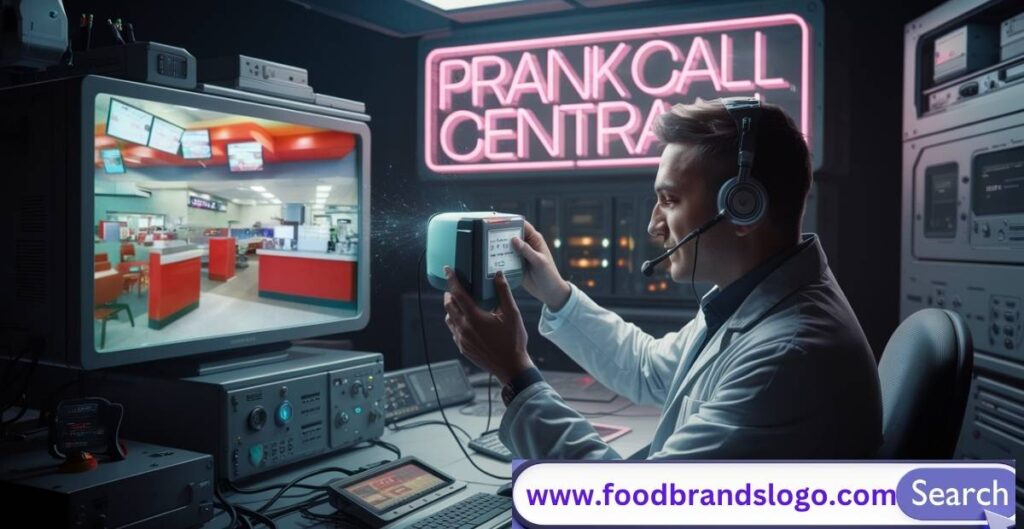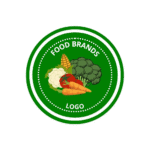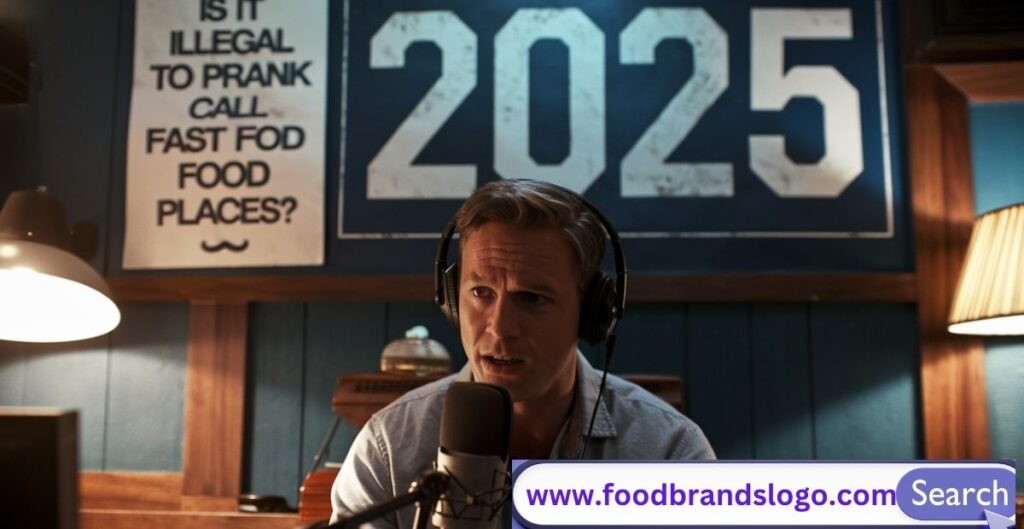Introduction
Imagine calling your local fast-food joint and pretending you’re Batman, asking for a “Batmeal” with extra “holy sauce.” Amusing, right? But is it just harmless fun—or crossing a legal line? In this article, we’ll explore prank call fast food places from every angle. You’ll discover what defines a prank call, learn about the legal consequences, see real-life mishaps, and find safer alternatives that won’t land you in trouble. By the end, you’ll know exactly where the boundary lies—and how to stay on the fun side.
Is It Illegal to Prank Call Fast Food Places? Everything You Need to Know

What is a Prank Call?
A prank call is when you dial someone to play a trick, often for laughs. When it comes to prank call fast food places, you’re typically calling a restaurant, inventing a scenario, and watching how staff react.
- Sometimes you act silly or ridiculous.
- Other times, you mimic accents, pose urgent questions, or request bizarre orders.
- Normally, the goal is harmless amusement—for both caller and listener (we hope!).
However, intentions only take you so far. Here’s what matters next:
- Did you make up an emergency?
- Did you repeat the call multiple times?
- Did employees feel threatened, scared, or harassed?
Once the prank crosses certain lines, prank call fast food places can trigger legal issues. Let’s break them down.
Legal Implications of Prank Calling Fast Food Places
Yes, prank calls can get you in hot water. The legality starts depending on what you say and how often. Let’s break it into categories.
Harassment Laws
If your prank call fast food places becomes more than a silly joke—like making rude, threatening, or demeaning remarks—you could be charged under harassment laws. Many states treat repeated unwanted calls or offensive language as criminal harassment. When you’re purposely targeting employees or management, it could be considered phone harassment.
Disorderly Conduct
Behaving in a way that disrupts a workplace or causes employees to feel unsafe can trigger disorderly conduct charges. For instance:
- Repeatedly calling, even after staff hang up.
- Yelling obscene or profane language.
- Refusing to identify yourself when asked.
Such behavior could qualify as disorderly, especially if it’s making staff feel distressed or unsafe.
Fraud and Misrepresentation
Pretending to be someone else—like a health inspector, police officer, or franchise owner—without authorization could land you in trouble.
Imagine saying, “This is Inspector Joe, I’m closing your store in 5 minutes!” The chain might take it serious and disrupt operations. That’s fraud. You’re misrepresenting authority, which could lead to charges or civil lawsuits.
Misuse of Emergency Services
Now, imagine calling 911 and claiming your KFC’s on fire. That’s not a prank—it’s a felony in most states. Misusing emergency lines diverts resources and puts people at risk. If your prank call fast food places involves fake emergencies, you’re playing with serious legal fire.
Business Disruption
If prank calls cause a shift slowdown, missed orders, or revenue loss, the fast-food chain could pursue legal action. Even on a small scale, persistent prank callers can drag restaurants into costly problems.
Local and Federal Laws
Laws vary from one place to another. Some states have broad statutes against phone-based harassment while others add layers for business-related disturbance. On the federal side, the FCC bans prank calls that cross lines into obscene or threatening territory. Cross-state calls could land you in federal court—especially if they break federal statutes.
Real-Life Cases of Prank Calls Gone Wrong
Let’s talk real cases so you’re not imagining worst-case scenarios alone.
- The Health Inspector Hoax (2018): A caller pretending to be a health official shut down a burger joint for an hour before management realized it was a prank. They demanded damages—and filed a police report. Local authorities charged the prankster under impersonation and business disruption statutes.
- Nerd Prank at Taco Bell (2021): A repeated prank call involving crude jokes got one caller fined $500 for harassment.
- The Threat Call at McDonald’s (2023): Someone called threatening mass harm if not served McNuggets with sauce. They got arrested under felony harassment and disorderly conduct.
These examples show how easily a joke can become criminal—fast.
Impact of Prank Calls on Fast Food Businesses
Let’s dive deeper into why these calls matter:
- Financial Loss: A prank call that “orders” hundreds of dollars—or forces employees to hang up—can cost real money.
- Employee Stress: Ever missed a shift because of endless prank calls? It stresses people out.
- Reputation Damage: If prank calls go viral, customers might avoid the place, thinking it’s unstable.
- Safety Concerns: Threats or fake emergencies force businesses to call police or evacuate.
- Operational Disruption: A fake health scare could shut down a restaurant for inspections.
So, when you dial up for kicks, there are real-world consequences behind every ring.
Ethical Concerns: Is Prank Calling Ever Okay?
A joke is funny only when everyone’s laughing. Ask yourself:
- Are you targeting a business with zero power to refuse or retaliate?
- Could employees feel stressed or threatened?
- Would you laugh if you were on the receiving end?
If the answer’s “no,” it might be time to delete that prank call from your plan.
Safer Alternatives to Prank Calling
Want a laugh without breaking laws—or hurting anyone? Here are some great alternatives:
Prank Videos
Record funny, harmless sketches with friends. You post them online—everyone’s in on the joke.
Prank Apps
Apps give you pre-recorded sounds or jokes to play near friends. No illegal calls involved.
Board Games
Games like “Cards Against Humanity” and “What Do You Meme?” can spark big laughs.
Comedy Shows
Attend an open-mic night or improv workshop with friends. Create scenes that’ll have you rofl.
Scripted Prank Shows
Shows like “Punk’d” or YouTube series organize clever pranks with clear consent (participants may waive rights beforehand).
Friendly Challenges
Try “guess the song in 5 sec,” blindfolded drawing contests, or creative scavenger hunts.
Social Media Fun
Use TikTok or Instagram for harmless memes, challenges, and fun trends—no phones rings involved.
How to Report Prank Calls
If a fast-food place is getting prank calls, here’s what they (or you!) can do:
- Record caller-ID: Keep track of date, time, phone number.
- Block numbers: Use call-blocking options on phones or with telecom providers.
- Call the police: For threats or emergencies.
- File telecom complaints: Agencies like FCC (US) handle obscene or harassing calls.
- Inform management: Provide logs and data to corporate.
- Press charges/civil action: Staff can hire legal help, especially if they face revenue or emotional damage.
Conclusion
Let’s wrap things up—and yes, we’re keeping it short and punchy (just like your favorite fries).
- A simple prank call fast food places can easily cross the line into illegal territory—especially when it harms, harasses, or disrupts.
- Laws around harassment, fraud, and emergency misuse apply. Even if you think it’s funny, authorities and businesses might not.
- Real incidents show fines, arrests, and real-world consequences.
- Businesses lose money, employees get stressed, and reputations can tank.
- Want a laugh? Choose safer pranks. Board games, apps, social media—all provide plenty of giggles without legal headaches.
- If a fast-food place gets repeated prank calls, document everything, block the numbers, and involve authorities if needed.
So next time you think about dialing up your local burger joint for a “saucy surprise,” remember: it might not be all fun and games. Instead, aim for pranks that get laughs—not lawsuits.
FAQs
Is prank calling fast food places actually illegal?
Yes, it can be. While some prank calls might seem harmless, others can violate laws like harassment, fraud, or business disruption—especially if repeated, threatening, or impersonating authority figures.
Can I get arrested for prank calling a restaurant?
Absolutely. If your call involves threats, repeated harassment, or misuse of emergency services, you could face criminal charges, including fines or jail time.
What’s the difference between a harmless prank and an illegal one?
A harmless prank typically involves no threats, no false emergencies, and only one call. An illegal one crosses into harassment, impersonation, or causes financial and emotional harm to employees or the business.
Are prank calls to fast food places considered harassment?
If you make repeated calls or say anything threatening, vulgar, or offensive, yes—it may qualify as harassment under state or local laws.
What should I do if someone prank calls my fast food business?
Start by documenting the calls, blocking the number, and notifying management. If the prank escalates or involves threats, contact local authorities or file a report with the FCC.
Are prank calls protected by free speech?
No. The First Amendment doesn’t protect speech that causes harm, incites panic, or interferes with business operations. Legal consequences still apply.
Can prank calling result in federal charges?
Yes, especially if the prank involves cross-state communication or violates federal telecommunication laws, such as impersonating law enforcement or threatening public safety.

